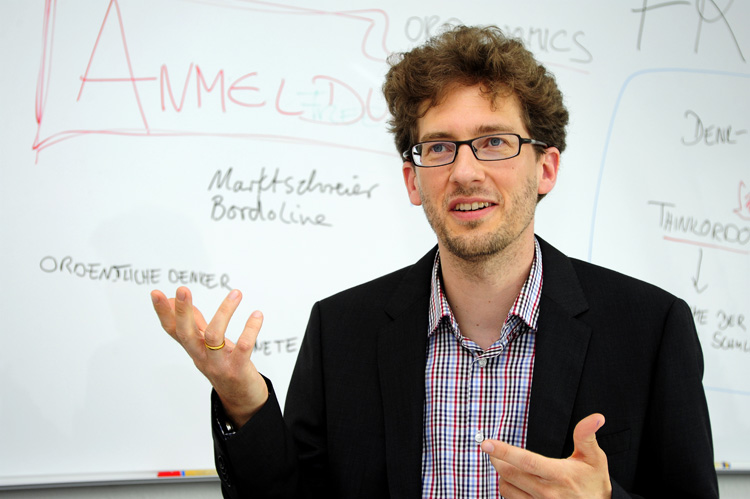What does the future hold for the Freiburg School and what can Ordoliberalism contribute to coping with current crises?
Freiburg, Mar 17, 2023
The Ordoliberalism of the Freiburg School which was headed by economist Walter Eucken should not be relegated to the past, it can also offer important ideas for coping with current crises, ranging from inflation through the climate and energy crisis to education policy – provided it is adapted to contemporary methods and international research. Tim Krieger is sure of this. The economist holds the Wilfried Guth Endowed Chair for Constitutional Political Economy and Competition Policy at the University of Freiburg and recently put on a workshop on the future of Ordoliberalism.
 Ordoliberalism of the Freiburg School can offer important ideas for coping with current crises. Photo: Adobe Stock/suriyapong
Ordoliberalism of the Freiburg School can offer important ideas for coping with current crises. Photo: Adobe Stock/suriyapong
Ordoliberals believe in the positive forces of the market economy and free competition – under certain conditions, says Krieger: “What’s important about Ordoliberalism is that it advocates what can be termed a regulatory framework for the economy. [This involves] rules for competition on markets, on the one hand enabling desirable market mechanisms to work, and on the other restraining them so that they cannot get out of hand.” This in turn demands a strong state that sets the rules and when needed enforces them against interest groups – yet at the same time does not otherwise interfere with market actors’ individual decisions and allows market forces to work.
A free market and a strong state
Once all-but forgotten, Ordoliberalism is currently undergoing a kind of Renaissance, says Krieger. In a world that seems to be increasingly disordered with numerous crises, questions about a more orderly future are rising. Answers are also being sought from Freiburg’s constitutional economics experts. And this is a new development, because in the past decade, suffering as it was from the aftermath of the eurozone crisis, Ordoliberalism received massive criticism: as a Protestant/German ideology – often likened to that of a traditional German housewife – it was held responsible for the Germans supposedly imposing frugality in Europe. Its insistence on market economy solutions, rather than simply redistributing public money within Europe, was also criticized.
Krieger believes that the question of why the market which has itself brought about some problematic conditions should be the means of dealing with them is understandable – nevertheless he regards this criticism of Ordoliberalism as a misunderstanding. On the one hand, rescuing European debtor states was highly unpopular across the political spectrum in Germany. On the other, since its birth at the end of the 1920s Ordoliberalism has always spoken out against unregulated market fundamentalism. For instance, it argued for contractual freedom as a core of the free market, but also for a ban on contracts at the expense of third parties, such as involving price fixing. Ordoliberals do not doubt that it is the prerogative of the state to set political objectives, but they argue passionately for leaving the means by which these objectives are best achieved to the market.
Pricing signals for climate objectives
Krieger cites emissions trading by the EU as a practical example of this. European politics set climate protection objectives in the form of maximum CO2 emissions, which are gradually reduced over time. Certificates are issued for the permitted quantities of CO2, and companies have to purchase them if they want to emit the greenhouse gas. Since the number of certificates is reducing they are becoming increasingly expensive, and this is a strong incentive for companies to pare down greenhouse gas emissions. Trade in the certificates enables small, innovative companies to benefit, especially from low CO2 means of production, while large, energy-intensive companies gain a little time for adapting, but have to pay an ever higher price. While it may not fit with the general sense of fairness for major individual CO2 producers to buy time, it is however extremely efficient for achieving real savings, says Krieger, because the maximum amount set by politicians is reached. “However, the state must be strong enough to continue to reduce the set quantity of emissions year on year.”
 Economist Tim Krieger of the University of Freiburg is working on developing the Ordoliberalist approach to meet contemporary demands. Photo: Thomas Kunz
Economist Tim Krieger of the University of Freiburg is working on developing the Ordoliberalist approach to meet contemporary demands. Photo: Thomas Kunz
Oil and power
This can be very difficult, as the dominant role of major oil producers in the global economy shows. Private oil companies and especially those run by the state can exercise an enormous influence on political decisions, because they can be a kind of state within a state, with a monopoly on power. “We have to break up monopolies like this, particularly given the background of climate change.” As the accumulation of economic power impedes free competition and exercises too much influence, preventing it is an aspect of the fundamental body of thought of the Freiburg School.
“In fact, today it has been empirically proven that economic freedom is restricted in countries with powerful oil elites,” says Krieger. This applies not only to obvious cases such as Russia or the autocracies in the Gulf, but also for Nigeria and Venezuela. Oil elites have no interest in young, innovative companies being able to develop potentially superior alternatives in the field of renewable energy. And naturally they also oppose the imposition of strict climate targets by the state.
International workshop
Against the background of such pressing problems, an international workshop organized by Krieger at the University of Freiburg was dedicated to the question of what modern Ordoliberalism might look like. Themes such as globalization and worldwide migration or the question of ‘Green Ordoliberalism’ would not have occurred to the founders of the Freiburg School in the 1930s. It is important to consider which theoretical and methodical approaches to this could be productive and internationally compatible, says Krieger: “The question of which rules – including informal – really guide a society is extremely topical.” There are for instance points of contact here with institutional economics, as well as with political science and sociology.
A ‘functioning’ and ‘decent’ order
Ordoliberalism should also take a sharper look at its normative roots, says Krieger – even if he does not see eye-to-eye on this point with all his colleagues in the field: “Walter Eucken was not just concerned about a ‘functioning’ order, but also about a ‘decent’ order.” That means not just considering the economy but the whole of society, and for example questioning what an educational system that contributes to offering everyone the same opportunities might look like in a liberal order. “The economy is at the heart of the Ordoliberal approach,” says Krieger, “however, in the end it is fundamentally about a process that leads to an order in which as many people as possible feel at ease and participate in.”

